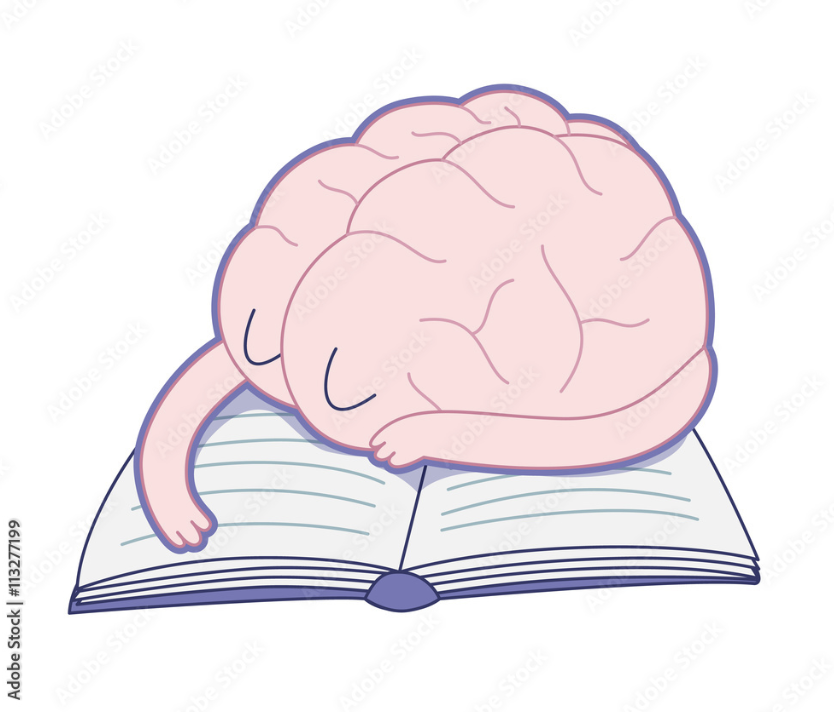
From Zzz’s to A’s: A Deep Dive into Sleep-Induced Learning | Popular Delusions (wordpress.com)
Imagine if you could study for your midterms by listening to tape recordings of every lecture while sound asleep, rather than cramming during the day or pulling all-nighters. This phenomenon, known as sleep learning, would be an ideal situation and it seems a common belief among college students, 68% of whom believe that people can learn new information while asleep (Lilienfeld et al., 2010). But is it true that students can harness the power of their subconscious to learn new languages, study test material, and improve themselves all while getting a good night’s rest?
To answer that question, it’s important to understand the science of sleep. Sleep is a dynamic process with distinct stages, including rapid eye movement (REM) and non-rapid eye movement (NREM) sleep. NREM sleep occurs in three phases and is characterized by muscle relaxation, slow brain waves, and slow heart rate and breathing. In the fourth phase, REM sleep, the body becomes completely paralyzed – with the exceptions of blood circulation and respiration – yet the brain activity is similar to that of an awake individual, hence the vivid dreams that occur. In an ideal night of sleep, the body and brain repeatedly cycle through the different phases of sleep known as drifting off (NREM1), light sleep (NREM2), deep sleep (NREM3), and REM sleep.
Here’s the catch to sleep learning: scientists suggest that humans cannot consciously retain and perceive information while asleep. Research scientists, Simon Ruch and Katharina Henke, of the Institute of Psychology of the University of Bern, highlight that during sleep the chemical conditions of the brain are not ideal for long-term memory formation (Ruch & Henke, 2020). This suggests that when we sleep the brain functions that promote learning dwindle and any information discerned by the unconscious mind is forgotten and discarded by the conscious mind upon awakening.
This is further proven in a study on the memory for words heard during sleep where the participants were asked to categorize audio as real or made-up words using response handles placed in their left and right hands just as they entered NREM sleep. Following this categorization, researchers administered a memory test where the participants had to identify what words they remembered hearing when the sleep playlist was mixed with e new words. After the conclusion of the study, researchers determined that while certain words are correctly categorized during NREM sleep, “upon awakening, participants did not explicitly remember words processed during sleep and failed to distinguish them from new words” (Andrillon & Kouider, 2016). All-in-all, while traces of information may be remembered, it is not significant enough to completely learn a foreign language or be adequately prepared for an exam.
On the flip side of that, some have capitalized on the false notion that sleep learning is very much possible and even necessary for those looking to use the brain’s full learning potential. Take the Sleep Learning website, for example, that encourages users to effortlessly improve their learning ability by offering various audio recordings ranging from “instant motivation” to “learn[ing] Spanish while you sleep,” all for the low price of $19.95. In addition to that, sleep-assisted learning has become a popular fixture in TV shows, movies, books, and even kids’ cartoons. In the animated television series, Dexter’s Laboratory, Dexter – the lead character – opts to study for an upcoming French exam by listening to a recording while he sleeps. He wakes up the next day speaking nothing but French. Although such occurrences in pop culture are entertaining and enthralling, we mustn’t embrace them as facts but rather see them for what it is – exaggerated information disguised as entertainment.
To conclude, if you are looking to learn effectively, the tried-and-true methods of active engagement while awake are your best bet. While sleep is important in facilitating learning, it is not an adequate means to learn.
References
Andrillon, T., & Kouider, S. (2016). Implicit memory for words heard during sleep. Neuroscience of Consciousness, 2016(1), niw014. https://doi.org/10.1093/nc/niw014
Lilienfeld, S. O., Lynn, S. J., Ruscio, J., & Beyerstein, B. L. (2010). 50 Great Myths of Popular Psychology: Shattering Widespread Misconceptions about Human Behavior. Blackwell Publishing. https://ci.nii.ac.jp/ncid/BA91476696
Ruch, S., & Henke, K. (2020). Learning during sleep: A dream comes true? Trends in Cognitive Sciences, 24(3), 170–172. https://doi.org/10.1016/j.tics.2019.12.007